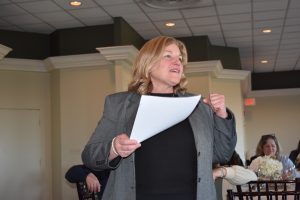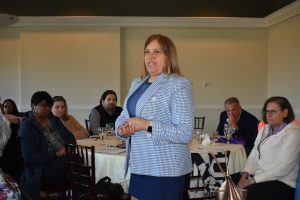As legislators continue to debate proposed bills, CEA members and leaders are ensuring their perspectives are heard.
A series of CEA County Forums provided just such an opportunity, bringing educators face to face in discussions with their local senators and representatives.
On April 3 in Woodbridge, a joint Middlesex/New Haven CEA County Forum brought together more than 80 CEA members along with Senate President Martin Looney, Education Committee Vice Chair Jennifer Leeper and fellow representative/committee member Mary Welander, Higher Education and Employment Advancement Committee Vice Chair Kara Rochelle, and Labor Committee Vice Chair Jorge Cabrera.

Rep. Mary Welander is joined by fellow lawmakers Kara Rochelle, Jorge Cabrera, and Jennifer Leeper in addressing teachers’ priorities.
The five lawmakers heard from their teacher constituents about specific challenges they face and shared their own goals for addressing Connecticut’s teacher shortage.
“An extraordinary amount of legislation that’s focused on educators has gone through the Education Committee and is moving through Appropriations, Finance, and other committees because we have come out, testified, and made the case for these bills,” said CEA President Kate Dias. “But this is a long legislative session. It goes until June 7, and in that time, we have a lot of ground to cover. That means we need to continuously talk about why play-based learning is important, why kindergarten start age is important, why we need a minimum salary for teachers, and why pandemic recognition for our work is important. Think about stories you have to share. We need to be persistent and consistent and not let up.”
This is the year
A longtime legislator and former state senate president himself, CEA Executive Director Donald Williams emphasized, “The legislative agenda we have now is unlike any other since probably 1986, and that’s because the teaching profession demands it, and the crisis and need for resources have not reached this level for decades.”

Senate President Martin Looney, seated next to CEA Secretary Tara Flaherty, calls 2023 a critical year for passing education bills.
“This is a critical year, similar to 1986, when people were leaving the teaching profession because salaries and morale were falling behind,” Senator Looney agreed, adding, “The state made a commitment to enhance teacher salaries and support for education, and we are in that position again, 37 years later. This year, as we all know, we are confronting many of the consequences of the pandemic. Students have suffered significant deficits, having had their school experience interrupted, and many in the early grades have come to school unprepared, having never been read to at home. So this is a year when we need to renew our commitment to quality preK and the K-12 education system and make that investment. This is the year to make sure teacher salaries are accelerated and advanced. The psychological problems children are experiencing are showing up in schools, and many children who need services beyond what’s available in school cannot get them. We hope to step up ECS funding and funding for special education reimbursement and address the tremendous disparities in education funding in our state. We know that you are on the front lines of all of this every day.”
The right start
Hamden elementary teacher Lisa Carlson was one of many CEA members at the county forum who spoke out in favor of raising the kindergarten start age and bringing back play-based learning, two of CEA’s top priorities this legislative session.
“I’ve been a teacher for 30 years, and 18 of those years have been in kindergarten,” Carlson said. “Earlier in my career, there were eight states that allowed four-year-olds to start kindergarten. Now Connecticut is the only state to do so, and I want to know why this is so difficult to change. Why can’t we do what’s developmentally appropriate for children? Kindergarten is not play-based anymore; it is a seven-hour academic day, and it is not appropriate for four-year-olds.”
“You’ve hit the nail on the head,” said Representative Leeper. “Kindergarten is not what it used to be. I once viewed the early kindergarten start age as an equity issue that gives children a head start, but I’ve since had a change of perspective, and I see that we are setting many kids up to struggle and fall behind. This year there’s a lot of momentum behind this proposal, which has been voted out of committee.”

Preschool teacher Marilyn Della Rocco describes lingering hardships that COVID created for children and their teachers.
“We are a play-based program, but our kids are coming in with no idea of what play is,” said Marilyn Della Rocco, who teaches preschool at a public school serving students from Bridgeport, Trumbull, Stratford, Fairfield, and Monroe. “Part of that is the pandemic, as parents worked long hours trying to figure out the virtual thing, just like we were doing. Because parents often had to work from home while simultaneously caring for their young children, we have students who can sit and do video games longer than they can sit for a three-minute book. We have kids with boundary issues and kids who flee the classroom when we pull out a book. I’ve never had that in the 31 years I have taught. We have many more students who are very dysregulated, have never been read to, and are in school because they are at the eligible age and their parents can’t afford another year of daycare.”
“Lack of affordable childcare and lack of space in preK programs in Bridgeport and elsewhere are areas our legislators need to look at,” said Bridgeport teacher Mia Dimbo, adding that schools often address family hardships by, for example, providing daily and take-home weekend meals for children.
Stress tests
“Kindergarten starting age definitely matters, and you can see the effects all the way up through high school, where kids are unprepared socially and academically,” said Bridgeport high school teacher Vidyotma Gupta, adding that the burden of standardized testing also robs students of precious learning time.

Vidy Gupta says the pressure put on early learners is felt all the way at the high school level.
“Our last two weeks alone were allocated to SATs, with the next two weeks focused on Next Generation Science Standards. So we have lost a month of instruction for back-to-back testing for the same students. They are zombies.”
“This is not sound practice,” said Darien teacher Katy Gale. “This is teaching kids how to answer particular questions over and over again. We have other ways to understand that children are making progress. If you listen to us—the biology teachers, the physics teachers, the preK teachers, the third-grade teachers, the middle school teachers—we can tell you how we get our children to move forward, and it’s not standardized testing.”
“This year we had 1,000 new students come in,” said Bridgeport Education Association President Ana Batista. “They’re tested in September and throughout the year on language, and we’re wasting time that we could be spending actually teaching our students.”
Dias noted proposed legislation currently before lawmakers would ask the state to audit the time and money spent on standardized testing. “We’re educators, and we understand the value of assessment, but that shouldn’t be forcing kindergartners to spend 45 minutes on a laptop instead of playing.”

Overtesting is not sound educational practice, says Darien teacher Katy Gale.
“As a literacy coach,” said Westport educator Faith Sweeney, “I find a whole month of instruction is taken out of the curriculum to focus on testing, on a single piece of data. Whole units are created around testing. Critical thinking is not happening, because we need to focus on ‘read the passage, answer these questions.’ It’s not a positive impact, and it causes a lot of stress not only for teachers but our students as well.”
Speaking of her own school-age children, Representative Welander acknowledged, “The stress is enormous. My children are exhibiting higher levels of anxiety every year because they’re worried about doing well. I hate standardized testing. It takes time away from what teachers need to be able to do, it takes a ton of money away from the district, and I fully appreciate what teachers are saying. Please reach out to your legislators and share directly with them exactly how much time you spend on standardized testing. A personal email from a teacher in my district is so valuable.”
Leeper said she plans to ask the State Department of Education to include in their evaluation of assessments how student growth has been impacted by federally mandated standardized testing over the last 20+ years.
“I think they’d likely find it hasn’t been impacted,” she said. “We’re supposed to be collecting all this data to move students along and target instruction, but that’s not what’s happening, because all the time teachers need to implement those strategies is now being sucked up administering assessments.”
Many teachers at the county forum described watching students breeze through standardized assessments by checking the same box for the entire test, because, as one teacher put it, “They realize it doesn’t matter. Many colleges no longer require SATs, but test results are still used to evaluate teachers and schools, and they continue to perpetuate a system of haves and have nots.”

Greenwich teacher Lil Perone asks legislators to prioritize applied learning and critical thinking over teaching to a test.
“What are our priorities?” asked Greenwich Education Association President Lillian Perone. “If you can’t apply your learning, it’s a waste. We need critical thinking, we need problem solving, we need compassion and kindness, we need understanding, we need balance and connection. Life isn’t black and white, and testing shouldn’t be black and white.”
Incentives for teachers
Teachers also spoke out against edTPA, a burdensome assessment that keeps many aspiring educators from entering the profession.
“I took edTPA three years ago, and we need to end it,” said Stamford elementary school teacher Sophie Janvier. “Just as standardized testing is expensive, wastes time, and doesn’t accurately assess our students, edTPA is costly and time-consuming and does not accurately evaluate the quality of an aspiring teacher. It becomes yet another obstacle and does more harm than good for incoming teachers.”

First-year teacher Sara Azukas says teacher salaries are out of line with the costs of becoming a teacher.
“EdTPA was a big waste of time that I could have spent instead learning from a range of teachers,” first-year teacher Sarah Azukas agreed. “Although I passed, I know college graduates who missed by one point and have to pay to take it again.”
On the subject of expenses, Azukas, who teaches art in Regional School District 15, added, “I can’t afford to move out on a teachers’ salary, and I cannot afford to go to graduate school while I’m working to pay off my undergraduate student loans. I have years and years of debt.”
Asked about the minimum $60,000starting salary CEA is requesting for all Connecticut teachers and whether it would help her, Azukas gave an enthusiastic, “Yes!”
Amity tenth-grade English teacher Shannon Martin said, “The reality is that teachers are fleeing. I don’t understand how salaries aren’t one of the most important things going through the Appropriations Committee. I am 34 years old, have been teaching for 12 years, and could not afford rent on my own, because do you know how much childcare costs? It’s my entire take-home pay every two weeks. And let’s talk about undergraduate and graduate student loans. I get really fired up, because we deserve a living wage. We deserve a bill of rights.” Martin also explained that she and other English teachers have faced increasing criticism and questioning around the curriculum they teach, despite having earned master’s degrees.
“Let us teach,” she said, “and pay us a living wage.”
“A minimum starting salary for teachers is so important,” said fellow Hamden educator Katie Kiely, who also stressed the need to make it affordable for teachers to live where they teach. “I’m just breaking $60,000 after teaching 13 years.”
More to the conversation
Waterbury Teachers Association President Kevin Egan noted that retaining teachers is complicated in a climate heavy with escalating demands and light on resources.

Waterbury teacher Kevin Egan says retaining teachers is key to maintaining Connecticut’s quality education.
“We’re 200 teachers short,” Egan said, “and 70 of those are special education teachers. We’re trying not only to attract teachers but to keep the good talent we already have. There are so many crucial components in the major bills before our legislators—including non-monetary incentives such as duty-free prep periods, which I know our elementary school teachers really need.”
“Everything you’ve said here has really hit home for me,” Cabrera told CEA members, “because I am married to an educator who started in Bridgeport in 2001, and we’ve been having these conversations for 22 years. I hear what you’re saying. Every year in our home we have a conversation along these lines, with tears: ‘Should I be doing something else?’ It’s really hard for educators, and after COVID, it’s gotten even harder. Every morning we hear in her school that six teachers are out today, or eight teachers are out, and there are no subs—and it’s all legitimate. There are health issues, there are issues educators have at home with their own kids. Our system is at a breakig point, and it breaks my heart, because my wife loves what she does, but little by little, this profession is breaking down.”
Cabrera told educators speaking up at county forums, “What you do here is critical, but what you do when you leave here is even more critical. You’ve got to put our feet to the fire—not just the legislators in this room, but all of us. We have a huge opportunity to tackle these issues and many others.”
“It’s really important that legislators hear many voices,” Leeper agreed.

Bridgeport teacher Ana Batista decries the loss of instructional time to standardized testing.
Rochelle added, “I urge you to email your legislators regarding an Educator Bill of Rights and give them specifics about what you’ve experienced and witnessed. We need more teachers, because what you do is the cornerstone of our democracy, and by providing a free, high-quality education, you are supporting the American dream. When you write to your legislators, include where you live and also where you teach, because we share these concerns with our colleagues in other districts.”
Now is a critical moment for communicating with legislators, said Dias, and CEA makes it easy. Attend back-home meetings hosted by CEA, participate in CEA’s upcoming #RedforEd Fix the Crisis Day of Action on Thursday, April 27, and more. Register here.







